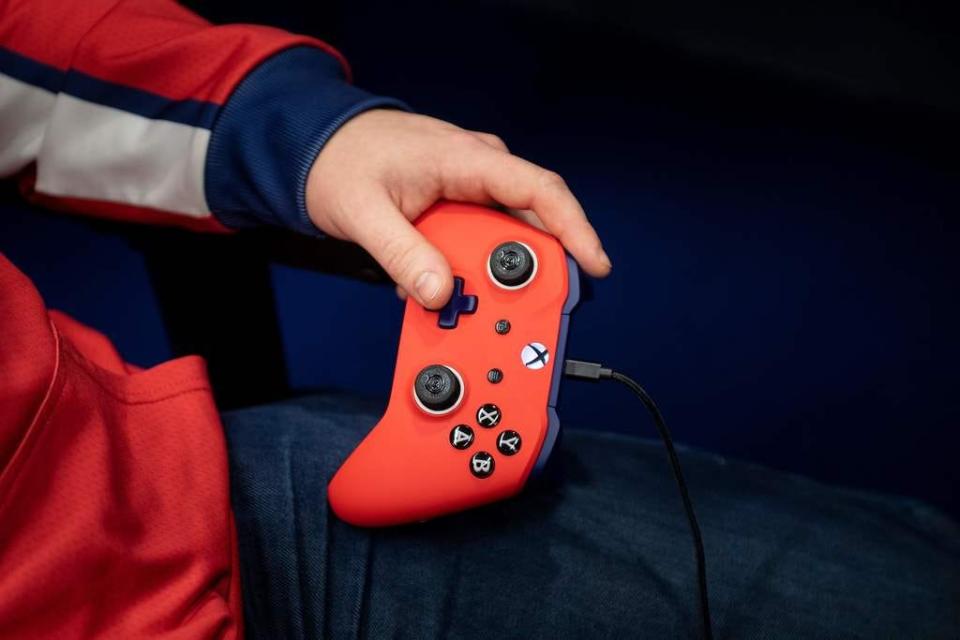Your kids can learn a lot playing video games during the coronavirus school shutdown
As COVID-19 keeps schools shuttered worldwide, millions of parents are discovering a newfound appreciation for their kids’ poorly paid teachers.
Stuck inside with restless children, unclear missions and dodgy digital tools, many quarantined parents have answered the home-schooling call of duty with … well, "Call of Duty," loosening household rules around video games. In Italy last month, young people staged what Bloomberg News called “a Fortnite marathon,” contributing to a more than 70% rise in internet traffic.
If you are feeling guilty about your kids’ gaming habits, I have a one-word suggestion: Don’t. With few exceptions, the hours your kids spend gaming are hours well spent.
Do everything you can to keep their learning on track — there’s help out there. But this is an unprecedented time, and your kids can use a break from the bad news and chaos. Instead of adding to your stress, think instead about what your kids get from gaming, what it means to them and how it can actually bring your family together.
7 benefits from video games
Research on the cognitive benefits of games now finds that they help develop better visual acuity, emotional regulation and decision-making. Many games are simply beautiful storytelling tools. Well-crafted video games satisfy kids’ desires for seven key things that life, especially school, often fails to provide.
Channeling George Carlin, a teacher friend calls them “Seven F-Words You Can Use in School”:
►Failure. Games are hard. Game designers even have a name for this: “hard fun.” A game isn’t fun in spite of its difficulty, but because of it. “I dislike failing in games,” the theorist Jesper Juul writes, “but I dislike not failing even more.” Games actually stand apart from ordinary life, Juul says, because we’re not disappointed if we find it easy to learn to drive a car. But we’re disappointed if a game is too easy.
Hotline: Share your coronavirus story
►Feedback. In school, it is mostly delayed, mostly summative. Rewards or punishments arrive long after the work is done, with little opportunity to earn a better result. Games offer exactly the opposite: a nonstop stream of just-in-time feedback that helps players iterate better solutions and face the next challenge (and there is always a next challenge).
►Fairness. Games, unlike life, give us a fair chance. Young people intuitively understand this. They see games as reliable systems that, for all their difficulty, reward hard work despite a player’s initial ability or skill level. It’s why Microsoft doesn’t offer Minecraft ADHD — everyone plays the same version. It’s why there’s no Fortnite gap between low-income and wealthy players (though wealthy parents still push to give their kids an edge).
Coronavirus new normal:School is closed, Mom Academy is open, and what's a number bond?
►Flow. When was the last time your kids got lost in what they were doing in school? Video games offer this reliably, affordably and without fuss, perfectly aligning players’ skills and the work at hand. The result, writes psychologist Mihaly Csikszentmihalyi, is an “optimal experience” that’s powerful: “The ego falls away. Time flies.”
►Fantasy. Games invite young people to step into the shoes of aspirational characters: heroes, villains and even everyday adults. The typical high school actually does this well — but to benefit, students must stick around until after the last bell rings. After-school activities such as drama, debate, sports and the school newspaper offer these aspirational roles. Harvard scholar David Perkins aptly calls this “playing the whole game.”

►Freedom. "Civilization" game designer Sid Meier once called games “a series of interesting decisions.” Freedom of choice makes play appealing, starting with the first choice: whether to play or not.
►Fellowship. Games are social. Doing something hard with your friends, then reflecting on the results, is satisfying and powerful. Yet it's seldom a feature of most classes.
Video games can be educational
All of which is to say: Take this opportunity to play with your kids. Cut short that Zoom call, close your laptop, find a space on the sofa and try their games yourself. You’ll be lousy at first, but this is part of the delight they’ll feel. Ask them what they like. You’ll be amazed at the answers.
And if this isn’t a satisfying argument, consider that as your confinement endures, games can help get a bit of school-facing work done. You can role-play as Henry David Thoreau at Walden Pond or as an attorney defending the Constitution. You can learn about databases or logic, topology or inequality, photosynthesis or atomic structure, the water cycle, the carbon cycle and the nitrogen cycle, and history from the Dust Bowl to the Iranian revolution.
ER doctor on coronavirus: What needs to happen now? A 5-week national quarantine.
Not topical enough? Games will teach about social distancing, immune systems, antibiotic resistance, bacterial and viral spread, and, yes, pandemics.
If all else fails, you can always help save the world from COVID-19 by playing a crowdsourced protein-folding game that may actually find a cure.
Time well spent indeed.
Greg Toppo is a former national education writer for USA TODAY who teaches journalism at Northwestern University in Qatar. He is author of the 2015 book "The Game Believes in You: How Digital Play Can Make Our Kids Smarter." Follow him: @gtoppo
You can read diverse opinions from our Board of Contributors and other writers on the Opinion front page, on Twitter @usatodayopinion and in our daily Opinion newsletter. To respond to a column, submit a comment to letters@usatoday.com.
This article originally appeared on USA TODAY: Coronavirus home-schooling: Play video games, learn with your kids

